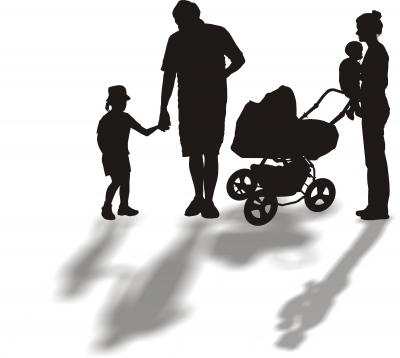7 Nonselfish Reasons for Having Children (Plus 3 that Actually Are Selfish)

Note that the title of this article does not say “Unselfish.” This essay is not out to make the case that parents are martyrs or saints. I simply want to examine a number of factors that go into child-bearing, which are often assumed to be selfish reasons for having children, in order to show that they aren’t necessarily selfish. Not unselfish, as in self-less. Just – not necessarily selfish.
But first, a word about selfishness
It's a given that whatever we do as human beings will have some selfishness mixed into it. Even if we start out with very good motives, we can find ourselves following through in a self-centered manner. Everyone is familiar with the common figure of the selfish parent who is using his or her children to find fulfillment, security, or validation through them. But what about the journalist who starts out in a quest to discover and proclaim the truth, only to end up much more concerned with his or her own political agenda, image, and personal or corporate brand? What of the aid worker who starts out wanting to help, but ends up feeling bitter and superior toward the “apathetic” masses back in the rich world? It seems that no human activity, however noble, is immune from having a kingdom of self built on it.
So there are many selfish motives out there, on all sides of the fence. We concede that many parents are very self-centered in their parenting, and all are self-centered to some degree. This is not the same as conceding what is often assumed, namely that anyone with a large family is necessarily more selfish, shortsighted or irresponsible than those with few or no children.
I am going to look at some of the more common “selfish” motives attributed to parents (particularly parents of large families), and demonstrate why they might be perfectly good motives (in some cases), or at least reasonable ones.
Then, at the end, we’ll deal with the stinkers.

1. The Unplanned Pregnancy
Nothing gets you branded selfish or irresponsible faster than an unplanned pregnancy. And it's true that many unplanned pregnancies are a result of a foolish failure to think ahead. But not all of them! And here's why ...
Why it’s not selfish: No one is in perfect control of their fertility. Many people want to have children and can’t. Others try for years before conceiving. Some get multiple births when they were expecting a single birth. Often, the woman who finds herself unexpectedly pregnant is in the same boat as all of these people. They are all discovering that they do not have as much control over their fertility as they thought. This is a discovery that most people make eventually. Even people who have decided in principle to have children, seldom see them arrive with the exact timing, numbers, and manner that they had envisioned. There are various health conditions that can make it hard to get pregnant, but which can also trick you at the last minute and land you with a surprise baby. Many couples are too discreet to share the details.
2. The Child They Can't Afford
Another very common line of reasoning is that it’s irresponsible and yes, selfish to conceive a child that you are not sure you can afford to provide with a good life, however the speaker defines a good life.
Why it’s not selfish:
a/ No one is in perfect control of their circumstances. Even with very good planning, things can happen. You could lose your job. God forbid, you could get into an accident and find yourself disabled. Or widowed. The awful possibilities are endless. So, although it makes sense to save and plan, in this dangerous world it is not possible for parents to guarantee their children a home in which nothing bad happens. Nor is it possible to plan for every possible event.
b/ There are differing definitions of what a child costs. We hear a lot about the “total cost of raising a child to age eighteen,” but this is of course an average with lots of assumptions in it. Some would say you can afford the child if you have a crib for it to sleep in, food on the table, and money to pay the hospital bill. Others would say you have to have the income and/or savings now, to put the child through college eighteen years from now, and everything in between, from Baby Dance class to private kindergarten on up. Regardless of the amount, it is rare that parents have all this on hand before the baby is born. They don’t need to. It is not paid in a one-time sum.
c/ An imperfect life is still a life worth living. When children are involved, people tend to become very idealistic. This is understandable. Of course, all of us want all children to grow up safe, healthy, and happy. An ideal is good, but this does not mean that those who are not living the dream would be better off dead. People who are struggling in difficult circumstances often still feel that their life is worth living. It is not our place to tell them (or their parents) that they should never have been born.
d/ Even someone raised in a perfect environment may become unhappy and/or wicked. Human beings carry the potential for their unhappiness inside them. It cannot be undone by a perfect environment.
(To make a related point, what is a perfect environment? Definitions vary, but it is slowly becoming clear that being sheltered from problems of every kind tends to make people weak, fearful, and entitled. This is not to say that we should not take care of our children or shelter them from true dangers, merely that they should have frequent experience with not getting their way, and with having to wait and work for things.)
e/ Often, hardship turns out to make people very strong. Many people who were raised in poverty, particularly in past centuries, developed an amazing work ethic. No child should be in a sweat shop, but there is a benefit when a child learns to be frugal and to do small jobs to help the family, such as caring for farm animals; carpentry; cooking; or other forms of helping the family business. These become skills that give the child a sense of accomplishment, self-confidence, and know-how, plus the ability to learn more as he or she moves into the adult world.
As a teenager, Laura Ingalls already knew how to bake bread, make cheese, sew, and many other jobs. By fifteen, she was ready to launch as an adult. Nor did she feel unloved because of all this hard work. She enjoyed working alongside her parents.
f/ You just never know what an individual child is going to find hard. One child might mind very much being poorer than her peers. Another might not. One might be very academic or artistic, another gives a fig for your art lessons and Ivy League schools.
In general, it is not hardship or lack of opportunity that make for an unhappy childhood so much as instability, stress, and tension in the family. These do often come with poverty… but sadly, they often come without it too.
What is your basic philosophy? In an ideal childhood ...
3. Taking Up Too Many Resources
“She is selfish to have so many children when there are people starving in ____.” Implication: her children are stealing the food right out of those poor people’s mouths.
Why it’s not selfish:
a/ Having more children does not necessarily mean using more resources. Resources are more than food, water, and square footage. A thin person might be using up more total resources than a fat person, if the thin one is fit because he or she buys organic and employs a personal trainer. By the same token, the family that eats out a lot uses up more resources than the family that eats in. The family that takes international vacations uses up more resources than the family that goes camping. And so on.
b/ How many resources we use up is not the only measure of our net contribution to the world. No one can live without consuming resources. But there are important questions: How were the resources obtained? Are they consumed wastefully or wisely? And finally, what else is the person contributing to the world?
Of course, most people realize that not even contribution is the only measure of a person’s worth. Some people, because of health conditions, may never be able to produce more than they consume. A sane society will still support these people, because we realize that they have human worth even if they are not efficient productivity machines.
So we do not want to start crunching production vs. consumption numbers on every person in society.
That said, it is worth remembering that while children start out being almost pure consumers, they grow up to be productive adults. A family with four children ages six and under may be consuming more than they are producing, net, at this time. But when those four children are grown, they will be productive members of society and will produce resources for many others.

4. Reproducing Ourselves/Leaving A Legacy
This one could be selfish, of course. It all depends on what the idea of a legacy means to the particular parent. Is it just about his or her name and fame? Not always …
Why it’s not selfish: This can be a form of a desire to make a useful contribution to the world. Of course you can make wonderful, lasting contributions without ever having children. But the world needs people, and providing people to build our future world is a very valid contribution to make, particularly if you see to it that these people are hardworking and well-educated according to their bent.
Nor does a person’s desire “to reproduce myself” necessarily mean that he thinks he, or his genes, are so much better than other people’s. Our future world is going to need LOTS of people to keep it going! It will need ordinary people, not just geniuses.
In a way, having children for the future can be a form of love for the human race. What kind of planet do we think of, when we think of a paradise on earth? Is it a wilderness with few or no people? Or is it a planet filled with people: farming, producing, creating, helping each other?
Is overpopulation a real problem?

5. Giving Your Parents Grandchildren
If a person is very negative on having children, and forces themselves to do it solely because of pressure from their own parents, obviously that’s not a good situation. But many people actually kind of want to have children, even without the pressure. They have many motives, of which pleasing Mom & Dad is just one. Kept in its place, it doesn’t have to be bad motive.
Why it’s not selfish: This can be an expression of love for, and gratitude to, one’s own parents. If people were even somewhat happy as children, they will want to re-create that kind of home. They imagine their parents as Grandma and Grandpa, and it makes them happy. Unless one’s relationship with one’s own parents is very fraught, this is not too hard to understand.
Our parents sacrificed and worked to raise us when we were kids. Of course as kids many of us did not feel grateful, because kids ought to be able to take for granted the fact that they are provided for. When we grow to be adults, we start to realize more and more all that Mom and Dad did for us. And when we, too, want to have children, it’s as if we were saying to our parents, “Yes, Mom and Dad. You did a good thing.”
When we become parents and realize what hard work it is, we not only feel grateful to our own folks for raising us, but also to our grandparents, great-grandparents, and hundreds of now-unknown ancestors, who raised children in much harder physical conditions than our own. If it weren’t for them, we wouldn’t be here. And being here is a good thing.
6. Love For Your Spouse or for Your Future Child
I personally don’t quite get why this is selfish, but I have seen it mentioned as a “selfish” motive. Perhaps if “love” means bowing to pressure from a partner who wants a baby, I might understand it. Though I would say that’s not exactly “love.”
But leaving aside the issue of using a baby as manipulation …
Why it’s not selfish: Though not everyone experiences this, many people already feel as if they can “see” the children they will have. They feel as if these are real people, and they already feel love for them. This can certainly become an unhealthy thing if the person is more in love with their vision of an ideal child than with the actual child, and if they proceed to try to shape the child to match that vision. But that does not always happen. Many people who love their children before they are even conceived go on to enjoy the process of getting to know the actual child they are given.
7. They Don't Need A Reason
Why not: In much the same way as Art, conceiving, delivering, and raising children in a family is a basic part of what it means to be human. As with Art, not every human being feels this impulse, and you can be a perfectly good human being without doing it. Nevertheless, it is a very human activity. Like Art, those who do it, often do it with very little reflection. They are just being what they are. And as with Art, to those who do not feel the Muse, it looks like a foolish and irrational activity.
Thus, the seven motivations that aren't necessarily selfish and might even be terrific! Now, for ...
The Three That Are Selfish
"I am lonely, I will have a baby to comfort me." Sorry, I can’t justify this one at all. Though the desire is understandable, it will end in sorrow. We all agree that a child cannot bear, was never meant to bear, that kind of emotional weight.
To prove your manhood/womanhood. If it’s coming from insecurity, this is not a good reason to have a child. However, it’s not so terrible if what the person really means is that they see parenthood as a way of participating in the Great Dance (see #7 above).
To prove that you can be a better parent than your parents were. Frankly, I think many people have this as one of their many motives, at least when they first start out. If it’s the main motive, things are not going to go well. If alongside this, there are better motives such as genuine love for the child, then this need to prove ourselves eventually dies when we see it is getting in the way of being the parent our child needs.
Some of us even realize, after a while, that we would be really, really lucky to be as good a parent as our own parents were.
Bibliography
- The XX Factor: How the Rise of Working Women Has Created a Far Less Equal World, by Alison Wolf. Crown Publishers: New York, 2013. This book is about the choices women face in our modern world, and how complex they are.
- Free-Range Kids, by Lenore Skenazy. 2009. About the dangers of overprotecting and over-pampering children, and about the myths that cause parents to be overly fearful.
- The Little House books by Laura Ingalls Wilder, including Farmer Boy, which is about her husband’s boyhood on a New York farm.
- The War Against Population: The Economics and Ideology of World Population Control, by Jacqueline Kasun. Ignatius, 1999. About why the world does, in fact, need people to keep being born.






